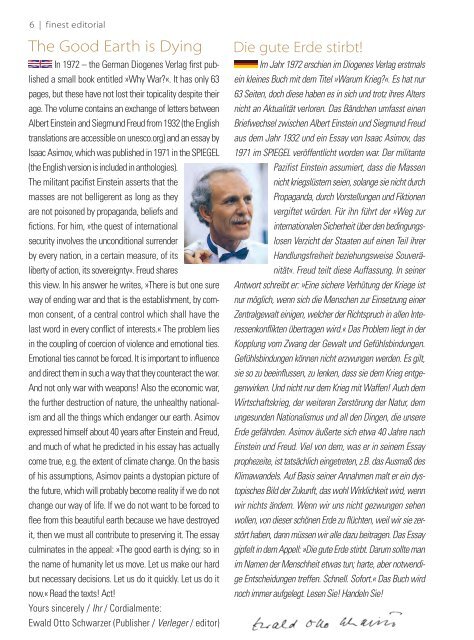You also want an ePaper? Increase the reach of your titles
YUMPU automatically turns print PDFs into web optimized ePapers that Google loves.
6 | finest editorial<br />
The Good Earth is Dying<br />
In <strong>19</strong>72 – the German Diogenes Verlag first published<br />
a small book entitled »Why War?«. It has only 63<br />
pages, but these have not lost their topicality despite their<br />
age. The volume contains an exchange of letters between<br />
Albert Einstein and Siegmund Freud from <strong>19</strong>32 (the English<br />
translations are accessible on unesco.org) and an essay by<br />
Isaac Asimov, which was published in <strong>19</strong>71 in the SPIEGEL<br />
(the English version is included in an thologies).<br />
The militant pacifist Einstein asserts that the<br />
masses are not bellig erent as long as they<br />
are not poisoned by propaganda, beliefs and<br />
fictions. For him, »the quest of inter nation al<br />
security involves the unconditional surrender<br />
by every nation, in a certain measure, of its<br />
liberty of action, its sovereignty«. Freud shares<br />
this view. In his answer he writes, »There is but one sure<br />
way of ending war and that is the establishment, by common<br />
consent, of a central control which shall have the<br />
last word in every conflict of interests.« The problem lies<br />
in the coupling of coercion of violence and emotional ties.<br />
Emotional ties cannot be forced. It is important to influence<br />
and direct them in such a way that they counteract the war.<br />
And not only war with weap ons! Also the economic war,<br />
the further destruction of nature, the unhealthy nationalism<br />
and all the things which endanger our earth. Asimov<br />
expressed himself about 40 years after Einstein and Freud,<br />
and much of what he predicted in his essay has actually<br />
come true, e.g. the extent of climate change. On the basis<br />
of his assumptions, Asimov paints a dystopian picture of<br />
the future, which will probably become reality if we do not<br />
change our way of life. If we do not want to be forced to<br />
flee from this beautiful earth because we have destroyed<br />
it, then we must all contribute to preserving it. The essay<br />
culminates in the appeal: »The good earth is dying; so in<br />
the name of humanity let us move. Let us make our hard<br />
but necessary decisions. Let us do it quickly. Let us do it<br />
now.« Read the texts! Act!<br />
Yours sincerely / Ihr / Cordialmente:<br />
Ewald Otto Schwarzer (Publisher / Verleger / editor)<br />
Die gute Erde stirbt!<br />
Im Jahr <strong>19</strong>72 erschien im Diogenes Verlag erstmals<br />
ein kleines Buch mit dem Titel »Warum Krieg?«. Es hat nur<br />
63 Seiten, doch diese haben es in sich und trotz ihres Alters<br />
nicht an Aktualität verloren. Das Bändchen umfasst einen<br />
Briefwechsel zwischen Albert Einstein und Siegmund Freud<br />
aus dem Jahr <strong>19</strong>32 und ein Essay von Isaac Asimov, das<br />
<strong>19</strong>71 im SPIEGEL veröffentlicht worden war. Der militante<br />
Pazifist Einstein assumiert, dass die Massen<br />
nicht kriegs lüstern seien, solange sie nicht durch<br />
Propaganda, durch Vorstellungen und Fiktionen<br />
vergiftet würden. Für ihn führt der »Weg zur<br />
inter nationalen Sicherheit über den bedingungslosen<br />
Verzicht der Staaten auf einen Teil ihrer<br />
Handlungsfreiheit beziehungsweise Souveränität«.<br />
Freud teilt diese Auf fassung. In seiner<br />
Antwort schreibt er: »Eine sichere Ver hütung der Kriege ist<br />
nur möglich, wenn sich die Menschen zur Ein setzung einer<br />
Zentralgewalt einigen, welcher der Richtspruch in allen Interessenkonflikten<br />
übertragen wird.« Das Problem liegt in der<br />
Kopplung vom Zwang der Gewalt und Ge fühlsbindungen.<br />
Gefühlsbindungen können nicht erzwungen werden. Es gilt,<br />
sie so zu beeinflussen, zu lenken, dass sie dem Krieg entgegenwirken.<br />
Und nicht nur dem Krieg mit Waffen! Auch dem<br />
Wirtschaftskrieg, der weiteren Zerstörung der Natur, dem<br />
ungesunden Nationalismus und all den Dingen, die unsere<br />
Erde gefährden. Asimov äußerte sich etwa 40 Jahre nach<br />
Einstein und Freud. Viel von dem, was er in seinem Essay<br />
prophezeite, ist tatsächlich eingetreten, z.B. das Ausmaß des<br />
Klimawandels. Auf Basis seiner Annahmen malt er ein dystopisches<br />
Bild der Zukunft, das wohl Wirklichkeit wird, wenn<br />
wir nichts ändern. Wenn wir uns nicht gezwungen sehen<br />
wollen, von dieser schönen Erde zu flüchten, weil wir sie zerstört<br />
haben, dann müssen wir alle dazu beitragen. Das Essay<br />
gipfelt in dem Appell: »Die gute Erde stirbt. Darum sollte man<br />
im Namen der Menschheit etwas tun; harte, aber notwendige<br />
Entscheidungen treffen. Schnell. Sofort.« Das Buch wird<br />
noch immer aufgelegt. Lesen Sie! Handeln Sie!


















